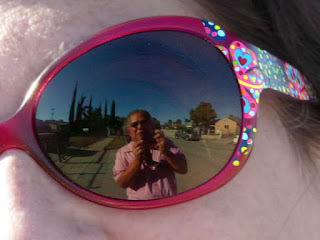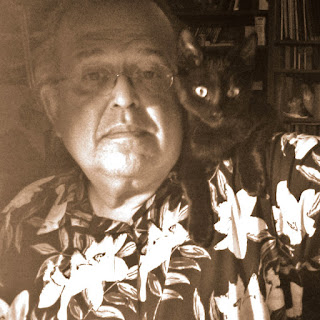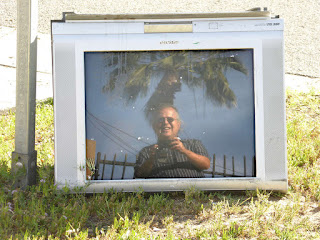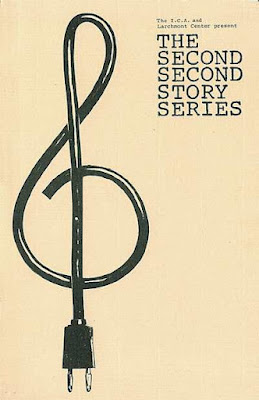Here are two pictures of me taken by my mother in
1974. The date is September 8, 1974, one month to the day since Richard M. Nixon resigned the presidency. The location is my hometown of Sioux City Iowa outside our family home (although our house is not shown in either picture). I had just turned 23 years old. The car is an infamous 1974
Chevy Vega purchased used earlier that summer.
My father is standing behind me in the first shot. In the second you can clearly see bags hanging in the back of the car. I was about to leave on a long trip.
I was going to California to attend graduate school in music. At the moment these pictures were taken I thought that I would be attending the University of California at San Diego, although my first choice was the more exciting but less practical California Institute of the Arts.
If you figure three days driving from Iowa to Southern California, today is exactly the 40th anniversary of my arrival in Los Angeles. Or maybe yesterday. Anyway, I've been here ever since. The longest I can remember leaving California is three weeks - and that only happened once.
During my undergraduate years in Minnesota, I remember telling my clarinet teacher that I would be continuing my education in California. His response was that he had noticed musicians who go to California were never heard from again. I thought that a little strange. Turns out that he was right, because he never did hear from me again.
I still have two copies of the Cal Arts Admission Bulletin from that year. In it composer Mel Powell, then the Provost, began his message so:
A scholar of the bizarre, having read the bulletin of several hundred American universities, colleges and conservatories, proclaimed the discovery of a curious new language of garniture. He found that bulletin prose tends to vibrate with fervor as the distances that separate description from reality extend themselves and promote euphoric envisionings by students, parents, teachers, administrators and trustees.
Despite this oblique warning (written in a curiously common double talk I had never encountered before), I was strongly, yes, euphorically attracted to the California Institute of the Arts, especially to studies in electronic music. I was also seduced by their lack of Eurocentrism which I understood at the time only with relief that foreign language proficiency was not required for graduation.
On my first day in California I drove directly to Valencia - home of CalArts - intending to retrieve my admissions deposit. They had not offered me enough financial aid and I needed that deposit money back. The original plan was to drive on to my second choice school the next day. Apparently being present in the flesh makes bureaucracy move more quickly because a couple days later, with offers of sufficient money, I found myself enrolled at CalArts.
All my major career opportunities during four decades in California can be traced directly back to people I met at CalArts. My time there was, for all its faults, a life-changing experience for me.
If you had asked me in 1974 where I would be in 2014, I don't know what I might have said. I'd probably first wonder whether I'd even still be alive.
If you had told me that I would still be a musician whose only tool is a computer and who works exclusively with people I never see - some of whom I've never even met - using something called the Internet, you would of course have been correct. I expect that I would have laughed at the absurdity of such a notion. "
Not likely. That's science fiction."
Here's a video of Arthur C. Clarke being interviewed in that same year 1974 about the future of computers. He was not far off in his predictions, although he suggests that only businessmen and executives will be able to live wherever they please thanks to computers. Thankfully I've become neither of those things.
Arthur C. Clarke might have said some really dumb things in the rest of that interview. This clip makes him sound prescient.
By attempting a career in music I was aware, even in 1974, that I wasn't likely to earn piles of money. I admit that I had faint hopes of getting famous. Getting rich seemed especially unlikely. I do feel extremely lucky that 40 years later I'm able to spend my life involved in music and even still make some money at it.
Do you notice that money keeps coming up in this post. My parents and I shared the uncertainty over whether I would be able to make a living as a musician. There was no way to know whether graduate education in music, especially at such a strange institution, would just be a waste of resources.
Financially the United States has changed a lot since 1974 and it hasn't been getting better for most people. In fact, according to this article,
The 40-Year Slump by Harold Myerson, 1974 was a watershed year for the American economy:
But no one could deny that Americans in 1974 lived lives of greater comfort and security than they had a quarter-century earlier. During that time, median family income more than doubled.
Then, it all stopped. In 1974, wages fell by 2.1 percent and median household income shrunk by $1,500. To be sure, it was a year of mild recession, but the nation had experienced five previous downturns during its 25-year run of prosperity without seeing wages come down.
What no one grasped at the time was that this wasn’t a one-year anomaly, that 1974 would mark a fundamental breakpoint in American economic history. In the years since, the tide has continued to rise, but a growing number of boats have been chained to the bottom. Productivity has increased by 80 percent, but median compensation (that’s wages plus benefits) has risen by just 11 percent during that time.
Driving off to start my adult life in 1974, I was really quite optimistic. I was taking a big chance on my dream of being a musician. Back then there was no way I could have predicted the details of what would happen to me. Or to the people around me.
I graduated from CalArts two years later and within a year I was working for Frank Zappa - starting salary was $410 per week. (Adjusted for inflation, that would be about $1600 today.) After putting over 100,000 miles on the Vega I traded it for a new Toyota. In September 1984 I quit working for Frank and started freelancing. I'm still a freelancer 30 years later. It was a few years more before I shaved off my beard. In 1991 I met Leslie Harris and we were married the next year. She has done far more for the positive quality of my life than being a musician ever has. We're living happily ever after as best we can. Life is good for us. I can only wish that were more universally true these days.
In 1974 I was driving off into an unknown future and I had no idea of what would happen. It's fair to ask what useful advice I would give my hopeful young self based on my 40 years of the California experience? A few things that come to mind:
- 1) When your father told you to save your money, listen to him.
- 2) Be honest with yourself about what you really want.
- 3) No matter how much you weigh, you will always feel fat.
And where, I wonder, will I be forty years from now. The odds are good that I will be merged one way or another with the ecosystem by then, well separated from consciousness, remembered only faintly by a few, mentioned infrequently in biographies of Frank Zappa. Hopefully, if my life means anything, I will have proved that life really is too short to spend it listening to ugly music.
Here are Mixed Meters posts about Cal Arts.
Here are Mixed Meters posts about Iowa.
Here are Mixed Meters posts about California.
Here are my expectations of what death is like.
My essay on the tenth anniversary of 9/11.

































